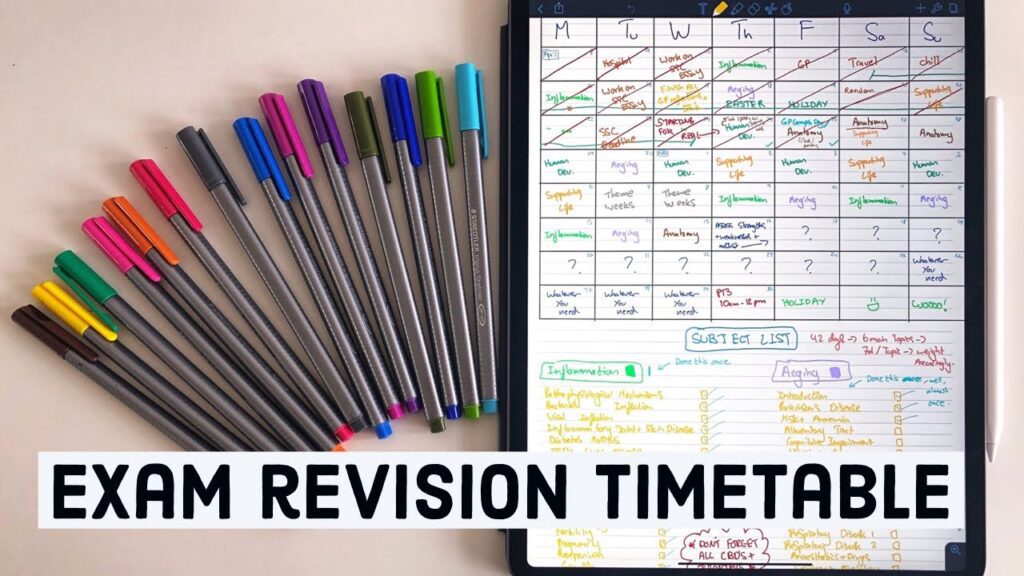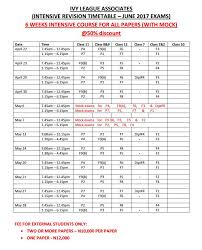An exam timetable is a schedule or a calendar that lists the dates, times, and locations of upcoming exams. (See our previous post on WAEC Timetable 2024).
This is a document that students use to plan and prepare for exams. The exam timetable usually contains information about the exams such as subject, duration, and format.
It is usually prepared and published by the educational institution or examination committee responsible for administering the examinations.
Exam timetables are essential for students as they help organize study time and plan each exam accordingly.
They also ensure that students do not miss any exams and that they are aware of any changes or updates in the exam schedule.
Before you continue reading this post, remember that you can search for a school near you for your children and relations on ngschoolboard school finder.
SEE ALSO: Top 55 Most Difficult Courses in the World

Importance of exam timetable in exam preparation
Exam schedules are important for exam preparation for several reasons:
Organization: Exam timetables help students organize their study time and plan their revision schedule. By knowing the dates of each exam, students can structure their study sessions accordingly, allowing them to review all the material they need to review before each exam.
Time Management: Exam schedule allows students to manage their time effectively by allowing them to allocate appropriate time to each subject based on exam dates.
This helps ensure that no subject is missed and that students are well-prepared for each exam.
Reduced stress: Knowing the exam date in advance helps reduce the stress and anxiety associated with last-minute cramming.
With a well-planned schedule, students can prepare calmly and efficiently, which reduces the likelihood of experiencing exam-related stress.
Conflict Avoidance: Exam planning allows students to avoid conflicts between exams. This is particularly important for students who have multiple exams on the same day or whose exam periods overlap.
As the student has a clear view of the exam schedule, students can plan their revision and exam attendance without worrying about conflicts.
Advance planning: The exam schedule allows students to plan ahead and make changes if necessary.
It’s easier to identify areas that need more attention or reschedule study sessions to suit your learning style.
In general, exam timetables are important for exam preparation and students who use them are likely to do better in exams due to better preparation and organization.
SEE ALSO: Most Difficult Courses in the World
Overview of The Topic “How to Use Exam Timetable to Ace Your Exams”

This article provides a guide on how to use exam timetables for effective exam preparation.
The article begins with an introduction to exam schedules, their importance in exam preparation, and a summary of the content of the article.
The first part of the article focuses on understanding exam schedules, including what they contain, how to interpret them, and key features to look out for.
The second part covers the use of exam schedules in exam preparation, such as planning the curriculum, maximizing study time, and identifying knowledge gaps based on the schedule.
The third and final section provides advice on how to use exam schedules effectively, including setting realistic exam preparation goals, starting exam preparation early, taking breaks and managing stress during exam preparation, and using the schedule as a guide rather than a strict schedule.
The article concludes by summarizing the importance of exam schedules in exam preparation, encouraging readers to try the tips provided, and reminding them to plan and prepare well in advance to maximize their chances of acing the exams.
SEE ALSO: How to Get Senior Secondary School Certificate.
Content of exam timetable
An exam timetable typically includes the following information:
- Exam dates: The timetable lists the dates of all the upcoming exams.
- Exam times: The start and end times of each exam are included in the timetable.
- Exam duration: The duration of each exam, usually given in minutes, is included.
- Exam subjects: The subjects or courses for which the exams are scheduled are listed.
- Exam venues: The location of each exam, including the building, room number, and seat number, are provided.
- Exam format: The format of each exam, such as multiple choice, essay, or practical, is usually included.
- Special instructions: Any special instructions or requirements for the exam, such as calculators or dictionaries, are listed in the timetable.
It’s essential to carefully read and understand the exam timetable to ensure that you know when and where each exam is taking place, the duration of each exam, and any special requirements that you need to prepare for.
By doing this, you can ensure that you are adequately prepared and can avoid missing any exams or arriving late for an exam. See an example of an exam timetable HERE.
How to interpret the exam timetable

The correct interpretation of the exam schedule is crucial for effective exam preparation. Here are some tips for interpreting the exam timetable:
Check the dates: Make sure you know the dates of all the exams and mark them in your calendar or syllabus.
Check Exam Time: Make sure you know the start and end time of each exam. Consider the travel time to the exam center and arrive on time so as not to be late.
Check Exam Duration: Know the duration of each exam and divide your study time accordingly. You don’t want to over or under-prepare for the exam.
Check exam subjects: Confirm the subjects or courses for which the exams are scheduled and make sure you have checked all relevant subjects.
Check exam locations: Know the location of each exam location and plan your travel route in advance. It is also important to know the room number and seat for each exam.
Check Exam Format: Understand the format of each exam and prepare accordingly. If it’s a multiple-choice test, practice answering multiple-choice questions, and if it’s an essay test, practice writing essays.
Check for special instructions: Note special instructions or requirements for the exam, such as a calculator or dictionary.
By correctly interpreting the exam schedule, you can ensure good preparation for each exam and avoid unexpected events on the day of the exam.
SEE ALSO: JAMB Result Checker with Phone Number
Key features of the exam timetable

When you look at the exam schedule, you need to consider several important features such as:
Exam dates: Make sure you know the dates of all your exams and mark them on your calendar or syllabus.
Exam times: Check the start and end times of each exam to make sure you are not late for any of them.
Exam duration: Note the duration of each exam and divide your study time accordingly. Exam subjects: Identify the subjects or courses for which the examinations are scheduled and ensure that you have reviewed all relevant subjects.
Exam locations: Check the location of each test location and plan your route in advance. Room Number and Seat: Know the room number and seat for each exam to avoid confusion on exam day.
Exam format: Understand the format of each exam (eg multiple choice or essay) and prepare accordingly.
Special instructions: Be aware of special instructions or requirements for the exam, such as a calculator or dictionary.
By paying attention to these key features, you can ensure that you are well-prepared for each test and avoid confusion or stress on test day.
Creating a study schedule using the exam timetable

Creating a study course with an exam schedule is an effective way to ensure good preparation for each exam.
Here are some tips for creating a study plan with a testing schedule:
Start early: Start studying well before the first exam. This will give you enough time to revise all the topics and prepare properly for each exam.
Identify knowledge gaps: Identify areas where you need more preparation and allocate more time to those topics.
Use the syllabus: Use the syllabus to allocate time to each topic and topic based on the exam date and duration. Be realistic: Be realistic about your learning goals and don’t try to cram too much into one day.
Schedule breaks and rest periods to avoid burnout.
Prioritization: Prioritize subjects or topics that challenge you and allocate more time to them. Check regularly: Check your syllabus regularly and make changes if necessary.
Make sure you are on track to prepare for a decision before the exams.
Use free time: Use free time to review notes or practice questions.
This can happen while driving or during breaks from work or school. By creating a study plan based on the exam schedule, you can ensure that you cover all the required topics and are well-prepared for each exam.
Make sure you allocate enough time for each subject and topic and prioritize your preparation according to your lack of knowledge. Download a free study plan Here.
Maximizing study time using the exam timetable

Maximizing your study time with an exam schedule will help you prepare effectively for each exam and perform to the best of your ability. Here are some tips to maximize your study time with your exam schedule:
Allocate Study Time: Use the exam schedule to reserve study time for each exam. Allow more time for exams that challenge you or topics you are unsure about.
Create a study plan: Use the exam schedule to create a study plan. Map out which topics and subjects you study each day and how much time you spend on each.
Break topics: Break each topic into smaller parts and focus on one part at a time. This can help you focus and avoid overwhelm.
Reviewing Past Exams: Use past exams to prepare for upcoming exams. Identify the areas where you need more practice and focus on them.
Practice, practice, practice: Practice is the key to success in the exam. Use practice tests, past papers, and quizzes to test your knowledge and identify areas where you need to improve.
Take breaks: Take regular breaks to rest your mind and avoid burnout. Short breaks help you focus and improve productivity.
Stay Organized: Keep your study materials organized and easily accessible. This can save you time and help you focus during your study sessions.
By maximizing your study time with an exam schedule, you can ensure that you cover all the topics you need and are well-prepared for each exam.
Remember to prioritize your study time, create a study plan and divide your subjects into manageable chunks.
Exercise regularly, take breaks, and stay organized to effectively maximize your study time.
SEE ALSO: Jamb Result Checker 2023
Identifying gaps in your knowledge based on the exam timetable
Identifying knowledge gaps based on your exam timetable can help you focus on the areas of your study that you need to improve.
Here are some tips for identifying knowledge gaps using the test schedule.
Review Exam Topics: Review the topics covered in each exam. This can help you identify areas where there may be gaps in your data.
Check Past Results: Check your past exam results to see if you consistently score poorly in any subject or subject. This can help you identify areas where you should focus your studies.
Take Practice Tests: Take practice tests and quizzes to test your knowledge and identify areas where you need more practice. Use these results to guide your studies.
Ask for feedback: Ask your teachers, tutors, or classmates for feedback on your class and past exam performance. They may be able to identify areas where you need improvement.
Review Study Notes: Review your study notes and textbooks to see if anything is unclear or needs revision.
Use online resources: Use online resources like videos, podcasts, and interactive quizzes to fill in your knowledge gaps.
By identifying gaps in your knowledge using the exam schedule, you can focus your studies on the areas you need to improve.
Be sure to check exam topics, check past scores, take practice exams, ask for feedback, review study notes, and use online resources to fill in knowledge gaps.
This can help you achieve your best results on exam day.
Set realistic goals for exam preparation

Setting realistic exam preparation goals is essential for success and staying motivated during the preparation period.
Here are some tips for setting realistic exam preparation goals.
Assess your abilities: Be realistic about your abilities and set goals that are achievable but challenging. Don’t set goals that are too difficult to achieve or too easy to motivate you to learn.
Break down goals: Break your goals down into smaller, manageable tasks. This can help you stay motivated and track your progress.
Set a Timeline: Set a timeline for achieving your goals. This can help you stay on track and ensure you are well-prepared before the exam.
Prioritize your goals: Prioritize your goals according to their importance and urgency. Devote more time to goals that are more important or require more preparation.
Celebrate the small victories: Celebrate the small victories. This can help you stay motivated and focused to achieve your goals.
Be flexible: Be flexible and adjust your goals as needed. If you find yourself in unexpected situations, adjust your goals and schedule to ensure you reach your goals.
Don’t overcommit: Don’t overcommit to goals or tasks. This can lead to burnout and weaken the motivation to learn.
By setting realistic goals to prepare for the exam, you can stay motivated, track your progress, and achieve your goals.
Remember to assess your abilities, describe your goals, set a schedule, prioritize your goals, celebrate small victories, be flexible and avoid over-commitment.
This can help you achieve your best results on exam day.
Start your exam preparation early

It is important to start your exam preparation early so that you have enough time to go through all the material and do enough revision.
Here are some reasons why it is important to start preparing for the exam early:
Reduce stress: Starting your exam preparation early can help reduce exam-related stress and anxiety. Starting early gives you more time to prepare and revise, which can help you feel more confident and prepared on exam day.
Cover more material: If you start your exam preparation early, you will have more time to cover all the material.
This can help you gain a deeper understanding of the subject and ensure you don’t miss important topics.
Improve retention: By starting your exam preparation early, you can review the material multiple times, which can improve your retention and help you remember information better.
Identify Weaknesses: Starting your exam preparation early can help you identify areas where you are weak or need more practice.
This can give you more time to focus on these areas and improve your understanding before the exam.
Revise enough: Starting your exam preparation early can help you revise enough. By starting early, you can review the material multiple times, which will help you retain information better and perform better on the exam.
Manage your time: Starting your exam preparation early will help you manage your time more effectively. If you have more time to prepare, you can create a study plan that is realistic and allows you to cover all the material without overwhelming yourself.
By starting your exam preparation early, you can reduce stress, cover more material, improve retention, identify weak areas, revise enough, and manage your time effectively.
Be sure to create a study plan, set achievable goals, and set aside enough time to cover all the material. This can help you achieve your best results on exam day.
Take breaks and manage stress during exam preparation
Taking breaks and coping with pressure at some stage in examination guidance is vital to make sure that you live motivated, centered, and keep away from burnout.
Here are a few hints on a way to take breaks and manipulate pressure at some stage in examination guidance:
Take Regular Breaks: Taking normal breaks allows you to recharge and live center. Take a brief spoil each hour to stretch, take a stroll, or do something else that relaxes you.
Exercise: Exercise is an excellent manner to manipulate pressure and enhance consciousness. Take a spoil and opt for a stroll or do a short exercise to launch endorphins and decrease pressure.
Practice Relaxation Techniques: Practicing rest strategies which include deep breathing, meditation, or yoga allows you to lessen pressure and enhance consciousness.
Stay Hydrated: Staying hydrated allow you to keep power and consciousness. Make positive to drink sufficient water during the day.
Eat Healthily: Eating healthy, balanced food allow you to keep consciousness and power. Avoid junk food, sugar, and caffeine, which could purpose crashes and make it tougher to consciousness.
Sleep Adequately: Getting sufficient sleep is vital to manipulate pressure and enhance consciousness. Make positive to get at least 7-eight hours of sleep each night time to experience rested and refreshed.
Manage Your Environment: Creating comfortable, quiet, and well-lit examine surroundings allows you to lessen pressure and live center.
By taking breaks, exercising, training rest strategies, staying hydrated, ingesting healthily, sound asleep adequately, and coping with your surroundings, you could manipulate pressure and live centered at some stage in examination guidance.
Remember to concentrate on your frame and deal with yourself, as this may enhance your overall performance and assist you to gain your goals.
SEE ALSO: WAEC Timetable 2023 for Science Student
Use the exam timetable as a guide, not a strict schedule
Although the exam schedule is an important tool for exam preparation, it is important to remember that it is only a guideline and not a strict schedule.
Here are some reasons why it is important to use the exam schedule as a guide.
Unexpected changes: There may be unexpected changes to the exam schedule, such as changes in exam dates or times.
That’s why it’s important to use the exam schedule as a guide and be flexible in your preparation.
Personal Circumstances: Personal circumstances such as illness, family emergencies, or other unforeseen events can affect preparation.
Therefore, it is important to use the exam schedule as a guide and modify the schedule as needed.
Individual Pace: Everyone has their own learning and revision pace. It is therefore important to use the exam timetable as a guide and adapt it to your own study pace.
Avoid overload: Keeping a busy schedule can lead to overload and stress. That’s why it’s important to use the exam schedule as a guide and change it so you don’t overwhelm yourself.
Stay motivated: A busy schedule can lead to burnout and loss of motivation.
Therefore, it is important to use the exam schedule as a guide and change it to maintain motivation and focus.
By using the exam timetable as a guide and remaining flexible in your preparation, you can adapt to unexpected changes, personal circumstances, and your own learning pace, avoid overload and stay motivated.
Remember to set achievable goals, create a study plan and allocate enough time to cover all the material. This can help you achieve your best results on exam day. (see How to Become a Certified Financial Analyst)
Recap of the importance of exam timetables in exam preparation
In conclusion, exam lesson plans are an important exam preparation tool because they provide a clear structure for revision and help students plan their study time effectively.
Here are some key points to remember about the importance of exam schedules:
Exam schedules provide a clear overview of the exam schedule, including dates, times, and subjects, helping students plan their study time effectively.
Interpreting the exam schedule requires careful attention to detail as it may contain important information such as specific exam rooms or instructions.
The most important features to consider in the exam schedule are the length of each exam, the order in which subjects are tested, and possible gaps or overlaps in the schedule.
Creating a study plan using the exam schedule helps students manage their time more efficiently and allocate enough time to each subject.
Maximizing your study time with your exam schedule means focusing on your weaknesses, setting achievable goals, and starting your exam preparation early.
Using the exam timetable as a guide, rather than a strict timetable, can help students remain flexible and adapt to unexpected changes, personal circumstances, and their own learning pace.
Taking breaks and managing stress while preparing for an exam is important to maintain focus, and motivation and avoid burnout.
By using the exam schedule effectively, students can prepare well for exams, perform at their best and achieve their academic goals.
See WAEC Timetable 2023 For Art & Science Students
Final thoughts on using the exam timetable effectively
In conclusion, it can be stated that the effective use of the exam schedule is very important from the point of view of preparation for the exam.
The student must pay special attention to the exam schedule, interpret it carefully, and use it as a guide to creating a study plan that meets his needs.
They should also try to maximize their study time, identify gaps in their knowledge, and set achievable goals to stay motivated and focused.
It is important to remember that the exam schedule is indicative and must be modified as needed to accommodate unexpected changes, personal circumstances, and individual learning paces.
Finally, taking breaks and managing stress during exam preparation can help students maintain focus, and motivation, and avoid burnout.
By using exam planning effectively, students can increase their chances of success on exam day and achieve their academic goals.
SEE ALSO: How to Write Application Letter for Teaching Job in School
Conclusion
I recommend readers try the tips given in this article to use the exam schedule effectively.
Whether you’re preparing for a high-stakes exam or a regular exam, an exam schedule can help you plan your study time effectively, identify gaps in your knowledge, and maximize your chances of success as a guide.
By following the advice in this article, you can create a study plan that works for you, set achievable goals, and manage your time and stress effectively.
Remember that exam preparation is a marathon, not a sprint.
Starting early, focusing, and taking breaks will help you stay motivated and avoid burnout.
So give it a try and see the results for yourself!
If you find this post informative, please encourage us by sharing it….
NGschoolBoard is not just a blog, but a project designed to make students’ research easy and faster. We have a dedicated team of staff working tirelessly to make sure you get quality information from our blog and all other features we will be rolling out soon. do well to subscribe to an email subscription so that you don’t miss out on our latest updates. Shalom!!!






JAMB 2023: JAMB Organises MOP-UP Exam For Students With Low Score Result - NGschoolBoard
[…] See How to Use Exam Timetable to Ace Your Exams […]
UNIBEN Aggregate Score For All Courses - NGschoolBoard
[…] Set specific goals and targets to track your progress. (see How to Use Exam Timetable to Ace Your Exams) […]
JUNE/JULY NECO TIMETABLE 2023 for Art & Science [PDF Download] - NGschoolBoard
[…] See How to Use Exam Timetable to Ace Your Exams […]
15 Mind-Blowing Fun Activities for Students in the Classroom 2023 - NGschoolBoard
[…] See How to Use Exam Timetable to Ace Your Exams […]
Top 10 Best New Quick Games To Play in The Classroom 2023 - NGschoolBoard
[…] See How to Use Exam Timetable to Ace Your Exams […]